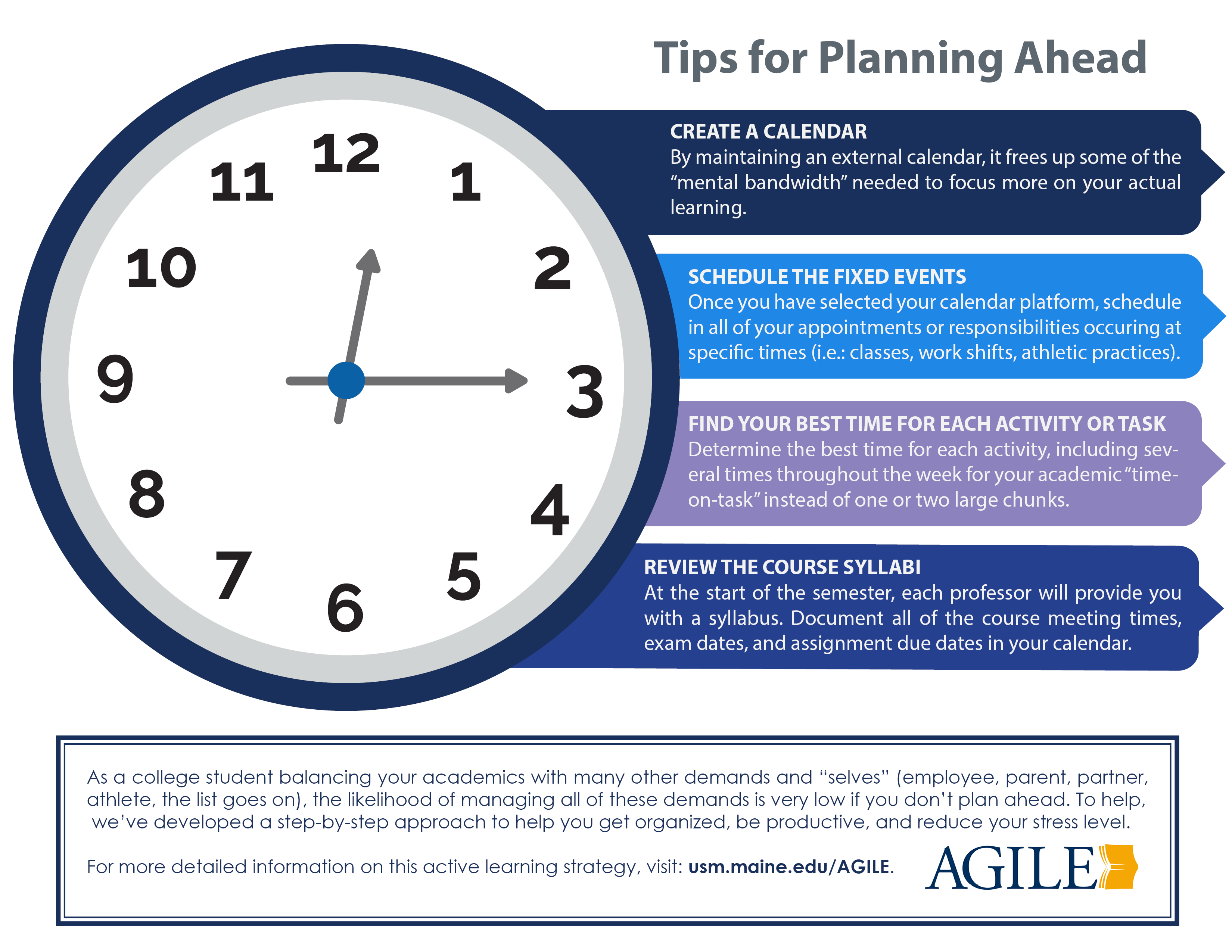By: Cristina Kerluke, Academic Support Program Specialist
This week’s article is adapted from our Time Management web page.
Scheduling enough time for your academics is essential. However, many students don’t put together a realistic plan or establish a routine that will enable them to achieve their academic goals. There are only so many hours in a day, days in a week, and weeks in a semester. And if you don’t pay attention, the end of the semester will arrive before you know it – catching you by surprise. To maximize your academic success, you must carefully manage your study time on a semester, weekly, and daily basis. While it’s never too late to do some planning, we strongly recommend starting the process at the beginning of the semester!
Create a Calendar
The brain can only hold a certain number of individual pieces of information in the conscious mind at one time. By maintaining an external calendar, it frees up some of the “mental bandwidth” to focus more on your actual learning. Some students say they like to have a physical calendar, such as a daily or weekly planner. We also highly recommend using Google Calendar, as every USM student can access it with their @maine.edu Google account. By creating a calendar with a platform such as Google Calendar, you’ll be able to access it from anywhere via your phone, laptop, or another device. If there are recurring events, you can schedule it once and have it repeat automatically. You also can use other features to your advantage in your time management efforts, such as electronic reminders before events.
Schedule the Fixed Events
Once you have selected your calendar platform (physical or web-based), schedule in all of your “fixed events.” These are appointments or responsibilities occurring at specific times. (Examples include your classes, work shifts, athletic practices, doctor’s visits, child care coverage, and other “non-negotiables” around which you will schedule other activities.) As part of planning ahead, you may also choose to take advantage of the free subject-based tutoring USM offers, with two appointments per subject area per week available to you. Consider building in weekly time with a tutor for each of your courses as part of your academic routine.
At the start of the semester, each of your professors will provide you with a syllabus for the course. A well-designed syllabus will provide a description of the course, the intended learning outcomes of the course, the required textbooks/materials, a weekly schedule of topics, dates of course exams, and due dates for all assignments. The syllabus is a tremendous resource for your planning and time management. Using your syllabi, document all of the course meeting times, exam dates, and due dates for all of your courses in your calendar.
Assign Tasks to Times
After scheduling your fixed events, take a look at the remaining time in your week and determine the best time to complete your academic tasks. After identifying the specific times throughout the week, assign specific tasks to times. For example, let’s say you’ve blocked off two hours of academic time on Sunday. Based upon your assignments and due dates, you may label the Sunday block as, “Read chapters 2-4 of Introduction to Economics,” or “Practice the Precalculus problems in MyMathLab.” It’s imperative to find several times throughout the week for your academic “time-on-task.” Why? This is not only time needed to read actively and complete assignments, but also to self-test your understanding as you go along. Also, having several shorter times scheduled each week creates opportunities for spaced practice, which leads to durable learning, improved memory, and better performance.
Embrace the Process
Remember that the planning process is just that, a process. You’ll notice that one of the keys to effectively managing your study time is to start with the big picture and then work down to the details. Your semester calendar provides direction and instruction for accomplishing the big picture. Your weekly and daily tasks provide the details required to accomplishing everything in your semester calendar, whereby enabling you to achieve your goals one day and week at a time. A few additional tips:
- Review your calendar each morning to get a sense of the day (and week) ahead.
- At night, do a “brain dump.” You can schedule a time in your calendar to address or think about something on your mind. If you prefer a “to-do” list, your Gmail account has a “Task” feature where you can make this list, along with a widget of your Google Calendar built right in. If you prefer pen and paper, that works too. Not only will this help keep your plan up to date, but it will also help you sleep better!
- Each week, ask yourself questions such as, “Did I schedule enough time for my most important activities? Did the times of the day work for the tasks I scheduled in? Did I have enough time for each task, or do I need to make adjustments to next week’s schedule?”
- Make time to revisit your plan and your calendar regularly to keep it working for you!
Visit https://usm.maine.edu/agile for additional strategies, printable resources (including our “USM Semester At-A-Glance” worksheet to map out your semester due dates), and new videos on “How to Read a Course Syllabus” and “How to Complete a Semester-at-at-Glance.”
Cheers to a new semester!

